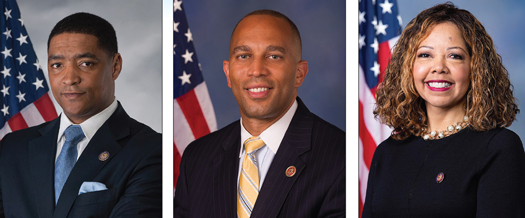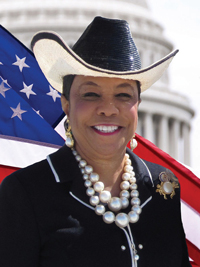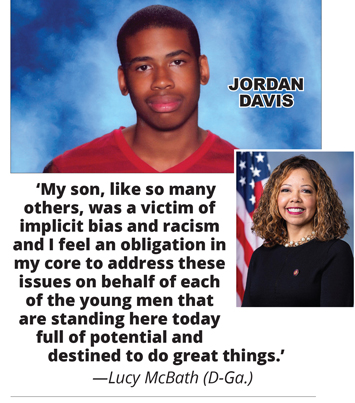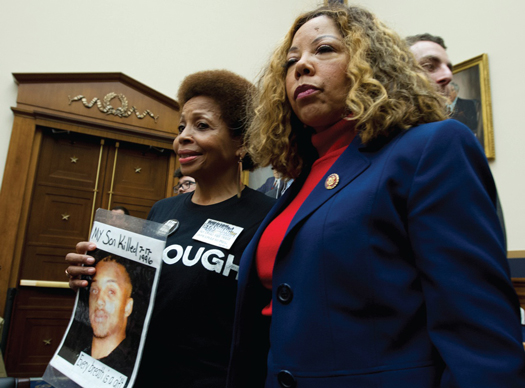A Congressional Commission To Assess Problems, Solutions For Black Men Proposed By Lawmaker
By J.S. Adams, Contributing Writer | Last updated: Jun 4, 2019 - 1:32:22 PMWhat's your opinion on this article?

Cedric Richmond (D-La.), Hakeem Jeffries (D-N.Y.), , Lucy McBath (D-Ga.)
|
MIAMI—2019 marks the 400th year since Blacks were brought to the shores of North America as slaves in Jamestown, Va. According to Ruben Roberts, it also marks the 400th year since the beginning of a plethora of problems currently facing Black men in America.
“I think we have suffered and continued to suffer from the effects of slavery in terms of a lot of times feeling insecure, self-worth, feelings of not being accepted, anxiety when dealing with the so-called larger society members,” said the president of the Miami-Dade branch of the NAACP. “[For] those issues to be remedied, will take a lot of time.”
For Florida congresswoman Frederica Wilson, the 400th year since enslaved persons were brought into the Virginia colony sparked an idea. It wasn’t to create an event to acknowledge the anniversary, but to create the Commission on the Social Status of Black Men and Boys Act. The commission would study issues affecting Black males—young and old—and how to fix those problems. The bill was introduced in March.

Frederica Wilson
|
Shortly after, Rep. Wilson held a press conference in Washington, D.C. in May. She invited members of the 5,000 Role Models of Excellence Project, a mentoring group she founded in 1993 to help guide young Black men to a better path, to participate.
“All too often, Black males in America are treated as their own class of citizens,” said Rep. Wilson at the press conference. “They are rarely given the benefit of the doubt. They are labeled ‘delinquent,’ not ‘rowdy.’ They are ‘hardened criminals,’ not ‘misguided youth.”
Some of the problems that the commission would tackle are high rates of homicide, high incarceration rates, unemployment, and education. Members of the Congressional Black Caucus will partially make up the commission. Only those with knowledge of issues affecting Black males would be part of the commission. It would be co-chaired by Reps. Wilson, Hakeem Jeffries (D-N.Y.), Cedric Richmond (D-La.), and Lucy McBath (D-Ga.).
Being part of the commission means a lot to Ms. McBath. She lost her son, Jordan Davis, in Florida. He was shot and killed by a White motorist in November 2012 for playing his music too loudly.
“I was teaching him to stand up against unrighteousness and to stand up in the face of injustice. I was preparing him to take his place in this world at the decision-making table as a powerful young Black man,” she shared during the press conference. “My son, like so many others, was a victim of implicit bias and racism and I feel an obligation in my core to address these issues on behalf of each of the young men that are standing here today full of potential and destined to do great things.”

|
Mr. Roberts has been working with the NAACP for a little over five years. When asked about the issues Black men face in America, he said he wouldn’t have enough time to go over it all.
“Black men are stigmatized,” he said. “We are seen by the larger society a lot of times as criminals. It’s evident when we walk across the street and people lock their car doors. We’re seen as angry, both Black men and women, when we are passionate sometimes. Definitely undervalued in terms of our work and contributions to society and this nation.”
Mr. Roberts also mentioned the 1994 crime bill that put many Black men in prison.
“You really systematically destroyed a lot of these families as a result of it,” he said. “It put our whole system in disarray because grandparents and other family members had to take on raising these children. Now there’s an emphasis on treatment where that should have been the same case for the Blacks that were using [drugs] back then. The emphasis was on locking them up.”
Mecca Grimo, a mentor with the 5,000 Role Models of Excellence Project, believes young Black men need the fundamentals.
“These young Black boys need the proper guidance that will not make them negative statistics in our society,” Mr. Grimo said. “They need education, purpose, life skills and love.”
Mr. Grimo has mentored young Black men since 2007. He’s been a teacher in Miami- Dade and Broward counties for the past 15 years.
“Ever since I started teaching, I noticed that there was a void in the Black family,” he said. “Many of our young Black boys are fatherless and have no positive role models to look up to as examples. So I got involved with the program to stand in the gap and make a difference.”
According to the NAACP, Blacks are incarcerated at more than five times the rate of Whites. Although Black and Hispanics make up about 32 percent of the U.S. population, they made up 56 percent of all incarcerated people in 2015. When it comes to illegal drugs, Blacks were locked up at six times the rate of Whites.
Mr. Roberts is hopeful the commission will make a difference, but is very doubtful.
“I just know [the commission] can bring about some awareness, but I think we all are aware, but it could be part of the official record of how we got here,” he said. “I think there’s some benefits to that. But to rely on the current government to try to find real effective remedies to that, I don’t have real confidence in that. You can’t depend on the group of people that put them in that position to elevate them and bring them out of that.
I think we’re looking for a saviour to save us instead of saving ourselves.”
Mr. Roberts has suggestions for possible reparations.
“Allow Black youth to be able to complete their undergraduate education for free. That could be a form of reparations,” he said. “Allow Black families to build by purchasing homes. Those things can help financially repair some of the damages that were done over 400 years and continue to be done today.”
Mr. Grimo thinks any effort is positive.
“Any efforts that are proactive in helping our community thrive and be better is always supported,” he said. “I’ve supported Congresswoman Wilson with the 5,000 Role Models Of Excellence Program and I support her efforts in bringing this commission to light.”

Rep. Lucy McBath (D-GA), right, greets Mattie Scott, who is holding a picture of her son George, who was victim of gun violence during a House Judiciary Committee hearing on guns violence, at Capitol Hill in Washington, Feb. 6.
|
He believes the reparations is an important aspect of the commission.
“The Black community should be awarded reparations because of the evident unequal, racist system that has affected generations and generations of a people,” he said. “The commission will be helpful in helping provide resources for young Black boys that they would not otherwise be exposed to— educating and empowering our young boys with the proper life skills tools to succeed and be positive, creative citizens in our society.”
Anthony Bodden, a screenwriter who wrote the movie “Belly” which hit the big screen back in 1998, believes young Black men need mentoring.
“I like solutions. I hate people that’s pointing out the problem all the time,” he said.
Mr. Bodden depicted some of his own experiences in the movie and said he wanted the message of the movie to reach the youth at that time.
“It’s hard sometimes for Black men to say I went through that too. It’s easier to learn when people raise their hand and say I been through it, too.”
Mr. Roberts said in order for real solutions to come about, Blacks need to come together instead of totally looking to government.
“I don’t look externally to any other group, I look internally to us. When we have knowledge of self and other things, we can truly overcome all obstacles,” he said.
INSIDE STORIES AND REVIEWS
-
-
About Harriett ... and the Negro Hollywood Road Show
By Rabiah Muhammad, Guest Columnist » Full Story -
Skepticism greets Jay-Z, NFL talk of inspiring change
By Bryan 18X Crawford and Richard B. Muhammad The Final Call Newspaper @TheFinalCall » Full Story -
The painful problem of Black girls and suicide
By Charlene Muhammad -National Correspondent- » Full Story -
Exploitation of Innocence - Report: Perceptions, policies hurting Black girls
By Charlene Muhammad -National Correspondent- » Full Story -
Big Ballin: Big ideas fuel a father’s Big Baller Brand and brash business sense
By Bryan Crawford -Contributing Writer- » Full Story






 Click Here Stay Connected!
Click Here Stay Connected!








